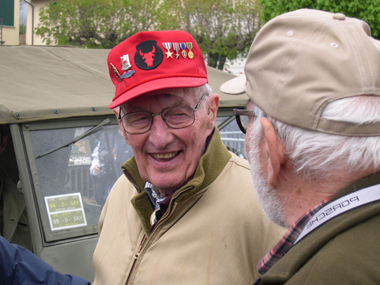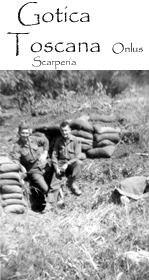Memorable Moments During World War II
34th Division while in Italy
by C. Snyder 2005
2005 - Carl Snyder at Barberino di Mugello
The 133rd Infantry Regiment (34th Division) was relieved from the front battle lines in November 1944. We had been located in the areas of Monte Belmonte and the church of Gorgognano fighting the Germans for a long time. Finally our regiment was relieved and sent back to the Resort City Called “ Montecatini Terme” ( about 25 miles NW of Firenze), noted for their Hot Mineral Baths (sulphur). We enjoyed a weeklong rest, refreshment and
re-organization our “I & R” platoon. All had a great time; we stayed in Hotels with electric and running water. We slept on cot beds with mattress and we slept with our clothes off. I well remember going in one of the public mineral bathhouse, a very large room with about 50 bathtubs (no modesty required). There I sat for a long time soaking all the dirt off my body that accumulated for several months. This was far better than washing and shaving out of my helmet and which on rare occasions was used as a potty.
While my Intelligence and Reconnaissance platoon “I & R”, stayed at the resort hotel we became especially friendly with a hotel employee. He related that it has been a long time since his family had any white flour. Our friend indicated if the Platoon could supply him with some flour the “I & R” platoon would be invited to his home which was several miles away. His family would make our platoon a delicious spaghetti supper with fresh bread, rolls and served with fine wine.
We could not refuse this offer, so we pressured our company Mess Sergeant into giving us 20 pounds of white flour including some sugar, coffee, even some spam and we gave it to our Italian friend. He told us he would guide us to his home two nights later. We took our “I & R” Platoon jeep several miles up in the hills to his Italian family home. As I remember we were near Barberino di Mugello. As a side note, our regiment took a short stop in Florence and stopped at the Palazzo Vecchio for our company to regroup. We then proceeded North. They served us a terrific good tasting meal of pasta, fresh bread rolls, and vino. Also the spam that was prepared by our Italian family, tasted almost like steak (not at like the Mess Sergeants served us). Since, no electricity was available during wartime in their home; we enjoyed our supper under candle light and lanterns.
This night is one of my memorable moments during the war in Italy. Sorry to say that I lost their name and address, I owe them another big Thank You!
On my trip in 2004 to Italy, we visited Livergnano, where I stayed with a family overnight. This is the place where the Germans had a Mark 10 Tank hidden in a caved area in the center of town.
A Sadder Time-Italians Suffered as well.
Our company was a short distance off the front line in reserve. Our kitchen crew served us a hot meal; we went thru the chow line with our mess gear and canteen cup then sat down wherever. Usually on the ground.
Some of the men would not eat all their food or drink all their coffee. We then would walk back to the garbage can to dump the leftovers. Usually there was a line of Italians with small cans or kettles begging us to dump the excess in their cans, so they too could have something to eat. Excessive coffee with cigarette buds was sought after as well... They were well appreciated of what we could supply.
Unfortunately spoils for the war.
Another Memorable Event with an Italian Family
Our Regiment (133rd) was moving back up to the front from a reserve position, north of Firenze. We had a layover for two days in some small village; our men took shelter wherever available. My “I & R” platoon were fortunate in that an Italian Family of five took us in their home. There family consisted of Pop, Mom, 2 young daughters, and Grand pop. I had one of my men PFC Salvatore Mucci from New York City who could speak Italian, be our interpreter. PFC Mucci, was a great communicator with the family and we took advantage of his background. We shared some of our food supplies, which they prepared for all of us. The women loved our chocolate bars and the men loved the cigarettes. Granpop used the cigarette tobacco to smoke in his pipe.
Every ones in a while the fire went out in the his pipe so Grand pop would took his bare fingers, picked up a red hot coals out of the fireplace and held it on his pipe until the tobacco was lighted again. You should have seen his hands and fingers; they were leather like and hard callous.
At nighttime we would sit around the fireplace with their family and our “I and R” platoon. We talking and tried to sing. We also shared our personal photos with them showing our American families. Their you daughters appeared to be thrilled hearing about America and they sure loved the chocolate bars. Nighttime came and the family retired to their rooms and we slept on the floor in the spare room and hallways. Naturally, we slept with our full gear of clothing and an army blanket. We enjoyed being able to take our shoes off for the night in a sheltered home.
Here too I do not remember the village or their names except one of the daughters names was Yolanda, she was the cutest. Again, I would love to say Thank You to that family?
Advancing Past the Gothic Line / Apennine Winter Line
Finally, after many long months on the winter line, near the village of Pianora, this was no mans land, (Apennine Winter Line), we broke through and advanced. On April 21st 1945, we were on the move to Bologna. I well remember that day!
Lt Col. Bruno Marchi, the Commander of the 3rd Battalion of the 133rd Regiment along with Lt. August F. Carioto, of Battalion S-3 and “K” Company, we advance in one line. “K” Company was riding on the Sherman tanks as we headed North on Highway 65 towards Bologna. As we traveled on Highway 65 we approached a blown out bridge, which crossed the Savena River, we were now approaching the town. The small village was not populated; apparently, they fled into the countryside, hiding from the Germans. I and the 133rd Regimental, Intelligence and Reconnaissance Platoon consisted of 7 jeeps and a number of noisy Sherman Tanks. These vehicles were our transportation for some period.
Lt Col. Marchi was determined to be the first American Troops into Bologna. Since the bridge was blown out, we need to have a different strategy. So the Colonel and his troops dismounted the Sherman tanks and started doing a fast march on foot. I took the imitative as the Platoon Sergeant of the “I & R” to locate an area slightly to the left of the bridge where we drove across the river. We crossed the river with our Jeeps, however the banks of the river were slippery, and we need to have assistance to reach the town. I signaled a Sherman tank driver to approach the river and cross the river enabling our jeeps to be pulled up the slippery bank. Finally, after a short period we had all our equipment across the river and heading towards Bologna. So now, with the Sherman Tanks and Jeeps in position I lead the parade of jeeps towards Bologna. We finally caught up with the other foot soldiers and proceeded to Bologna. The Sherman tanks riders were the men of the “K” company, 3rd Battalion 133rd Regiment. “I & R” Platoon is a special unit and we were assigned today to the 752nd Tank Battalion and with ‘K” company of the 133rd Infantry riding the tanks towards. Bologna. We were the first American Soldiers into Bologna and the first troops to set foot on the center square, Piazza Maggiore.
In April of 2005, I revisited Piazza Maggiore 50 years later and I had a heartfelt feeling that I was again back in Bologna, except it was 50 years later and under entirely different circumstances. I remembered the endless Portico’s. Instead of military clothing, I was in civilian clothing, instead of riding in a Jeep; I arrived into Stational Centrailia (n.d.r. Bologna Centrale) on the Eurostar. The people of Bologna were once again friendly and generous people. It also gave me an opportunity to rekindle my friendship with Edo Anasaloni. Edo was an underground operative, who today has published a number of books pertaining to World War II. One of the many Italian Patriots, Edo was so generous. Thank You EDO!
|

